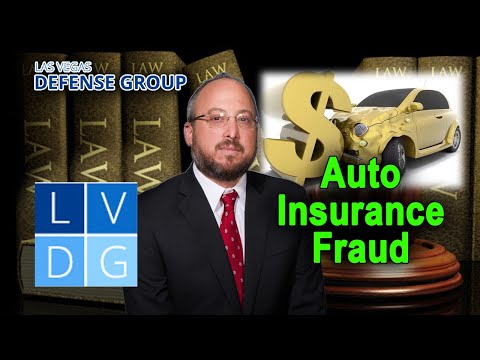
NRS § 686A.2815 prohibits automobile insurance fraud in Nevada, defined as bringing a false claim for auto insurance benefits. A conviction is treated as a category D felony with up to 4 years in prison and a fine of up to $5000.00.
Common examples of auto insurance fraud are:
- Exaggerating the costs to fix a car;
- Abandoning a vehicle and claiming that it was stolen (“owner give-ups”);
- Damaging a vehicle and claiming it was an accident (“staging an accident”);
- Making a false statement in a car insurance application;1 and
- Falsely claiming a car accident caused physical injuries2
Below our Las Vegas criminal defense attorneys answer frequently asked questions about car insurance fraud.

Factors such as rising gas prices, unemployment, and buyer’s remorse drive people to try to wrongly collect on car insurance for quick cash.
1. What are the penalties?
Car insurance fraud is a category D felony in Nevada. The sentence includes:
- 1 – 4 years in state prison, and
- A fine of up to $5,000 (at the judge’s discretion)
In addition, the court may order that you pay court costs and reimburse the state for the costs of investigating the case.3
However, it may be possible to negotiate a plea bargain where the charges get reduced or even dismissed.
1.1. Arson penalties
You may be accused of setting fire to your vehicle in order to collect on an accident insurance claim. In these cases, you may face charges for arson (NRS 205.010) in addition to insurance fraud. This is a category B felony, carrying:
- 1 – 6 years in prison, and
- A fine of up to $5,000 in fines
In addition, the court may order that you pay:
- Court costs;
- Costs of investigating and prosecuting the case;
- Costs of providing police and fire services to extinguish the fire4

Nevada car insurance fraud charges under NRS 686A.2815 are often coupled with arson charges.
2. What are the best defenses?
Two common defenses to auto insurance fraud charges are:
- No intent to defraud; or
- Illegal police search
It is not a defense that you did not own the car in question. For instance, a doctor who knowingly makes a false medical report about an injured driver to an insurance company is committing car insurance fraud.
2.1. No intent to defraud
It is not fraud when you make honest mistakes or accidents when dealing with your car insurance carrier. The process of making a claim can be very confusing. Plus you may be prone to making errors after a traumatic accident.
Example: Pam’s car is stolen. She contacts her car insurance company Progressive to make a claim. Then tells them that an expensive set of golf clubs were in the trunk. The clubs are actually in her garage, but she forgot she had put them there. Since Pam believes she is telling the truth, she is not guilty of fraud.
The Nevada Attorney General has the burden to prove beyond a reasonable doubt that you had the intent to defraud. This is a very high burden. Often there is no physical evidence of intent. As long as the defense attorney can raise a reasonable doubt, fraud charges should not stand.
2.2. Illegal police search
Courts can disregard incriminating evidence if the police found it through an illegal search and seizure. The defense attorney would file a motion to suppress evidence, which explains to the judge how the police search was unlawful. If the judge grants this motion, then the D.A. may be left with too weak a case to support a conviction for car insurance fraud.
3. What are the immigration consequences?
Any fraud conviction is a deportation risk for non-citizens.5 Therefore, immigrants facing auto insurance fraud charges should consult with an experienced attorney immediately.
An attorney may be able to get the charge dismissed or changed to a non-deportable crime. Otherwise, you may face removal from the U.S. if you get convicted.
4. Can the criminal record get sealed?
Yes. Convictions for car insurance fraud and/or arson may be sealed five years after the case closes. Though if the case gets dropped — either through dismissal or an acquittal — you can petition for a record seal right away.6
It takes up to a year to get a record sealed. Learn how to petition for a criminal record seal.
For additional help…
Charged with auto insurance fraud in Nevada? Call our Las Vegas criminal defense lawyers for a consultation. Or fill out our query form on this page.
And see our article on Nevada chop shop laws.
In California? Go to our information page on Penal Code Section 548-551 PC.
Legal References
- NRS 686A.290.
- NRS 686A.2815. This section states that: “Insurance fraud” means knowingly and willfully: 1. Presenting or causing to be presented any statement to an insurer, a reinsurer, a producer, a broker or any agent thereof, if the person who presents or causes the presentation of the statement knows that the statement conceals or omits facts, or contains false or misleading information concerning any fact material to an application for the issuance of a policy of insurance pursuant to this title. 2. Presenting or causing to be presented any statement as a part of, or in support of, a claim for payment or other benefits under a policy of insurance issued pursuant to this title, if the person who presents or causes the presentation of the statement knows that the statement conceals or omits facts, or contains false or misleading information concerning any fact material to that claim. 3. Assisting, abetting, soliciting or conspiring with another person to present or cause to be presented any statement to an insurer, a reinsurer, a producer, a broker or any agent thereof, if the person who assists, abets, solicits or conspires knows that the statement conceals or omits facts, or contains false or misleading information concerning any fact material to an application for the issuance of a policy of insurance pursuant to this title or a claim for payment or other benefits under such a policy. 4. Acting or failing to act with the intent of defrauding or deceiving an insurer, a reinsurer, a producer, a broker or any agent thereof, to obtain a policy of insurance pursuant to this title or any proceeds or other benefits under such a policy. 5. As a practitioner, an insurer or any agent thereof, acting to assist, conspire with or urge another person to commit any act or omission specified in this section through deceit, misrepresentation or other fraudulent means. 6. Accepting any proceeds or other benefits under a policy of insurance issued pursuant to this title, if the person who accepts the proceeds or other benefits knows that the proceeds or other benefits are derived from any act or omission specified in this section.7. Employing a person to procure clients, patients or other persons who obtain services or benefits under a policy of insurance issued pursuant to this title for the purpose of engaging in any act or omission specified in this section, except that such insurance fraud does not include contact or communication by an insurer or an agent or representative of the insurer with a client, patient or other person if the contact or communication is made for a lawful purpose, including, without limitation, communication by an insurer with a holder of a policy of insurance issued by the insurer or with a claimant concerning the settlement of any claims against the policy.8. Participating in, aiding, abetting, conspiring to commit, soliciting another person to commit, or permitting an employee or agent to commit any act or omission specified in this section.
- NRS 686A.291; NRS 686A.292.
- NRS 205.030; NRS 205.034.
- 8 U.S.C. § 1227.
- NRS 179.245; NRS 179.255.

